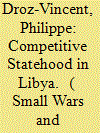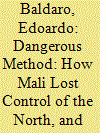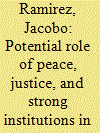|
|
|
Sort Order |
|
|
|
Items / Page
|
|
|
|
|
|
|
| Srl | Item |
| 1 |
ID:
159361


|
|
|
|
|
| Summary/Abstract |
Libya in 2011 witnessed a real process of political change, though different from all the policy-oriented jargon equating transition with a teleological transition to democracy. Due to the resilience of the Qadhafi regime in power and with the essential role of NATO intervention, the process was eased out by a eight-month civil war. Governance in post-Qadhafi Libya was not done through the rebuilding of centralized authorities. But it took the specific form of the emergence of multiple non-state actors embedded in local dynamics and then connected with weakened central authorities that had access to the huge Libyan resources. That raised complex questions about the quality of this mode of governance, especially at a time of pressing problems for Libya and its neighbors, whether direct ones (Tunisia, Egypt, Mali) or farther countries across the Mediterranean sea: terrorism with the expansion of Da’esh into the country and flows of refugees crossing Libya’s uncontrolled borders and flowing into Italy and then Europe by thousands.
|
|
|
|
|
|
|
|
|
|
|
|
|
|
|
|
| 2 |
ID:
159367


|
|
|
|
|
| Summary/Abstract |
This article analyses changes and failures in the northern Mali system of security governance, taking into account the period running from the declaration of the Malian Third Republic (1992) to the present. Considering northern Mali as an area of limited statehood, the article develops a comparative diachronic analysis, distinguishing between three phases, namely Militiarisation (1992–2002), Fragmentation (2002–2012) and Multiplication (2013–ongoing). For every phase the focus is on (1) the mechanisms of coordination among actors, (2) the distribution of coercive capacities and ruling power and (3) the forms of authority. Unintended consequences and collective problems are highlighted, in order to understand the current situation of insecurity in the area.
|
|
|
|
|
|
|
|
|
|
|
|
|
|
|
|
| 3 |
ID:
186459


|
|
|
|
|
| Summary/Abstract |
We conducted a qualitative study (2019–22) to contextualise Colombia's energy policy for sustainable development and renewable energy diversification, focusing on the new governance toolbox of market incentives, weak institutions, security risks in areas of limited statehood, and the role of indigenous people. We also examined how geopolitical events, such as COVID-19 and the Russian invasion of Ukraine, are affecting fossil fuel and decarbonisation strategies. Our findings suggest that weak institutions are a major obstacle to Colombia's energy transition. The Western definition of energy democracy takes for granted good governance in line with SDG 16: Peace, Justice, and Strong Institutions; however, in Colombia, the context of social unrest, violence, corruption, and inequality hinders its implementation. Colombia's energy policy considers green investment a market opportunity rather than a way of institution building or phasing down fossil fuels, and there is no meaningful communication with civil society, especially indigenous people, to develop small-scale green investment initiatives. This study enhances energy policy by emphasising the role of governance and strong institutions in energy democracy. We argue that if governments and corporations were committed to climate change mitigation, they would invest in institution building over renewable energy.
|
|
|
|
|
|
|
|
|
|
|
|
|
|
|
|
|
|
|
|
|